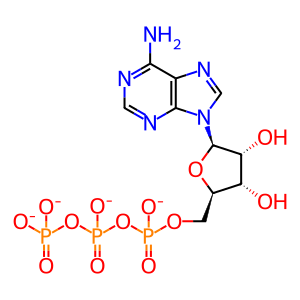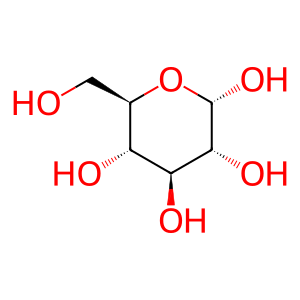Reaction: Defective GCK does not phosphorylate Glc to form G6P
Cytosolic glucokinase (GCK) (as well as three isoforms of hexokinase) catalyse the irreversible reaction of alpha-D-glucose (Glc) and ATP to form alpha-D-glucose-6-phosphate (G6P) and ADP, the first step in glycolysis. In the body, GCK is found only in hepatocytes and pancreatic beta cells. GCK has a high Km for Glc therefore is active when Glc is abundant such as the fed state. The rate of glucose metabolism in liver and pancreas is a function of GCK activity.
Defects in GCK are can cause maturity-onset diabetes of the young 2 (MODY2; MIM:125851), a heritable early onset form of type II diabetes. Mutations in GCK decrease the responsiveness of the beta cell to glucose leading to elevated glucose levels in the blood. GCK was the first MODY gene to be indentified and its mutations are the largest subset causing MODY, currently more than 600 across UK, Spanish and French populations. GCK utations causing MODY2 include E279*, T228M, G261R, A378T, E339K and G229R (Froguel et al. 1992, Vionnet et al. 1992, Stoffel et al. 1992, Vits et al. 2006, Shen et al. 2011).
Defects in GCK are can cause maturity-onset diabetes of the young 2 (MODY2; MIM:125851), a heritable early onset form of type II diabetes. Mutations in GCK decrease the responsiveness of the beta cell to glucose leading to elevated glucose levels in the blood. GCK was the first MODY gene to be indentified and its mutations are the largest subset causing MODY, currently more than 600 across UK, Spanish and French populations. GCK utations causing MODY2 include E279*, T228M, G261R, A378T, E339K and G229R (Froguel et al. 1992, Vionnet et al. 1992, Stoffel et al. 1992, Vits et al. 2006, Shen et al. 2011).
Reaction - small molecule participants:
ATP [cytosol]
Glc [cytosol]
Reactome.org reaction link: R-HSA-5621918
======
Reaction input - small molecules:
ATP(4-)
alpha-D-glucose
Reaction output - small molecules:
Reactome.org link: R-HSA-5621918


